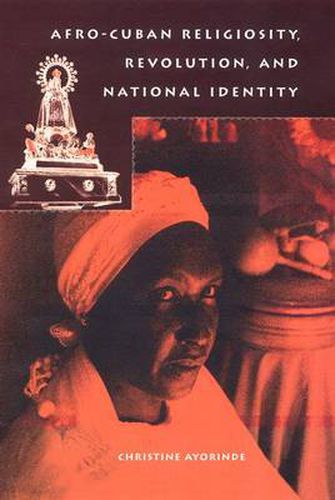Readings Newsletter
Become a Readings Member to make your shopping experience even easier.
Sign in or sign up for free!
You’re not far away from qualifying for FREE standard shipping within Australia
You’ve qualified for FREE standard shipping within Australia
The cart is loading…






Afro-Cuban religions - especially the practice of santeria, based on West African traditions - are an essential aspect of contemporary Cuban identity, Christine Ayorinde argues, and their existence has forced the current revolutionary state into bizarre and contradictory positions. Ayorinde’s bold assertion confounds official pronouncements about the irrelevance of religion in a modern socialist state. The revolutionary leadership has acknowledged the centrality of Cuba’s African heritage, while upholding the idea of a nationhood that transcends racial difference. Ayorinde proposes that the conflict between the desire to recognize the country’s African roots and the offical commitment to a secular state has created a complex, often paradoxical situation. Despite an ideological campaign to create a new, rational society, African-derived religions are emerging today for the first time from a position of marginality. Cuba now is beset with a sense of disorientation as well as a return to old habits and patterns, including racial inequality. Based mostly inside Cuba, Ayorinde’s research includes interviews and conversations with individual Cubans, including practitioners of Afro-Cuban religions from different ethnic backgrounds. Ayorinde also interviewed both religious and atheist commentators on Afro-Cuban religions and culture, including academics, journalists, party officials, and members of governmental and nongovernmental institutions, many at the forefront of efforts to give santeria greater recognition as a central component of the national culture. In addition, the book offers a fresh historical overview of changing religious forms and attitudes in Cuba, examining the encounter with European culture and the Roman Catholic Church, religious practice among slaves in the 19th century, the concept of racial fraternity articulated by Cuban patriot Jose Marti, and the witchcraft scares of the early decades of the 20th century, when religious practices were associated with criminality. Its emphasis on the period since 1959 and on the current decade places it on the cutting edge of studies that examine contemporary Cuban culture.
$9.00 standard shipping within Australia
FREE standard shipping within Australia for orders over $100.00
Express & International shipping calculated at checkout
Afro-Cuban religions - especially the practice of santeria, based on West African traditions - are an essential aspect of contemporary Cuban identity, Christine Ayorinde argues, and their existence has forced the current revolutionary state into bizarre and contradictory positions. Ayorinde’s bold assertion confounds official pronouncements about the irrelevance of religion in a modern socialist state. The revolutionary leadership has acknowledged the centrality of Cuba’s African heritage, while upholding the idea of a nationhood that transcends racial difference. Ayorinde proposes that the conflict between the desire to recognize the country’s African roots and the offical commitment to a secular state has created a complex, often paradoxical situation. Despite an ideological campaign to create a new, rational society, African-derived religions are emerging today for the first time from a position of marginality. Cuba now is beset with a sense of disorientation as well as a return to old habits and patterns, including racial inequality. Based mostly inside Cuba, Ayorinde’s research includes interviews and conversations with individual Cubans, including practitioners of Afro-Cuban religions from different ethnic backgrounds. Ayorinde also interviewed both religious and atheist commentators on Afro-Cuban religions and culture, including academics, journalists, party officials, and members of governmental and nongovernmental institutions, many at the forefront of efforts to give santeria greater recognition as a central component of the national culture. In addition, the book offers a fresh historical overview of changing religious forms and attitudes in Cuba, examining the encounter with European culture and the Roman Catholic Church, religious practice among slaves in the 19th century, the concept of racial fraternity articulated by Cuban patriot Jose Marti, and the witchcraft scares of the early decades of the 20th century, when religious practices were associated with criminality. Its emphasis on the period since 1959 and on the current decade places it on the cutting edge of studies that examine contemporary Cuban culture.